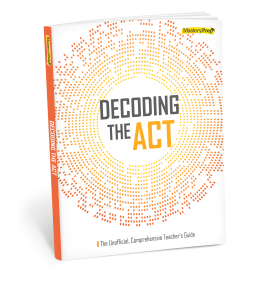Motivation and the ACT: Turn “I can’t do it” into “I can do it”
Chalk Talk #50
How often do you hear the phrase “I can’t do it” from your students? Nothing kills a student’s motivation more than feeling as though something is unachievable. When this mindset is put towards the ACT, it does much more harm than good, especially to their future.
The most fundamental, widespread, and yet nearly invisible motivation killer on the ACT is your students’ deep-seated suspicion that they just can’t do it; no matter how hard they try, they won’t get a good score on the ACT. If your students feel like their effort won’t be rewarded, they won’t make the effort. This is a difficult factor to address because students don’t always verbally tell you it’s a problem.
There are a few ways you can combat this motivation killer:
–
Social Proof:
As often as you can, celebrate peer accomplishment. When one student sees a classmate succeeding—particularly if those two students are in parity academically—it proves that success is possible.
Anecdotes about other students succeeding on the ACT can also support this process, particularly if you take the time to prove the similarities between the students in the anecdotes and your students in the classroom.
Correct Difficulty:
Start with the easier questions that many students in the room know how to answer. Use scaffolding as necessary. Don’t let ACT prep become defined in your students’ minds as “that segment of time where we have no idea what’s going on.” If that happens, you are reinforcing the “I can’t do it” philosophy and demotivating your students.
Avoid working on the ACT practice questions that all your students missed. These are the hardest questions and usually appear the most infrequently on subsequent tests. Focus first on the low-hanging fruit. Use early wins to build momentum.
Realistic, Valuable Goals:
All students want a “good score” on the ACT, but most aren’t clear on what that means. Make sure your students know what “good” is. If your student has a 17 on the ACT and feels improvement is impossible because he can’t reach 30, he doesn’t understand how the ACT works. If he can get up to 21, he could earn college scholarships and change his future. He would only need to answer about half the questions correctly to accomplish this! Ensure that your students have a goal they can achieve and that they understand the personal value they can obtain from reaching this goal.

This Chalk Talk has been adapted from our Decoding the ACT Professional Development curriculum. Click Here to get a free sample!
Check out our other test-prep solutions:
